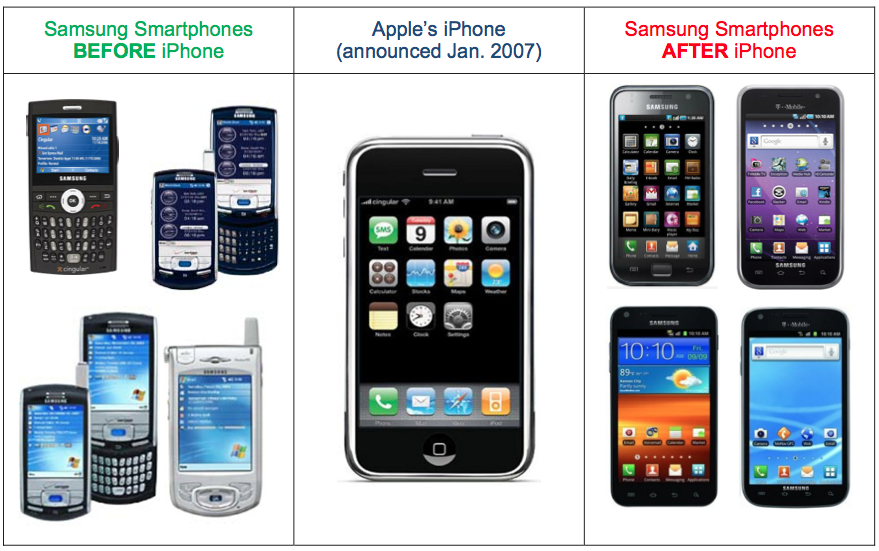An all-out patent litigation war between the biggest players in the smartphone industry, including Apple, Samsung, Motorola and Microsoft, has yielded very little for all parties involved.
Courts around the world have rebuked claims made in lawsuits from smartphone manufacturers, The Wall Street Journal detailed in an industry profile this week. The report was filed in response to the news on Monday that the European Commission found that Google's Motorola Mobility had abused ints dominance in mobile patents when it sought an injunction against Apple's iPhone in Germany.
The most high-profile victory thus far was won by Apple, which was awarded $1.05 billion by a jury in a patent suit against Samsung. But that decision is under appeal, and Apple has yet to see the money, while the judge vacated 40 percent of the award in March.
The U.S. Patent and Trademark Office has also moved to invalidate some patents that are key to Apple's litigation claims, specifically inventions related to pinch to zoom and rubber banding user interface elements in the company's pioneering iOS platform.
Apple also temporarily won injunctions in the U.S. against infringing Samsung products like the Galaxy Tab 10.1 tablet and Galaxy Nexus smartphone, but those bans were eventually overturned and sales were allowed to resume.
Patent litigation in the smartphone market has done little to shake up the status quo. Apple and Samsung remain the dominant players, together accounting for 100 percent of the industry's profit.
Meanwhile, competitors such as Nokia, Microsoft, BlackBerry, HTC and others remain bit players in the lucrative smartphone industry, as their own legal efforts have failed to secure any major, industry shaking victories.
Apple Chief Executive Tim Cook said last year that he would rather settle litigation than take it to court, but added that he will do whatever is necessary to protect his company's intellectual property. He said if he could get a guarantee preventing future patent infringement from competitors like Samsung and Motorola, settling would be the preferable option.
"The key thing is that Apple not become the developer for the world," Cook said. "We need people to invent their own stuff."
And one Samsung executive characterized the current sprawling litigation as "a loss" for the smartphone industry as a whole. Samsung VP David Eun said at last year's "D: Dive Into Media" conference that he felt lawsuits were stagnating innovation.
 Neil Hughes
Neil Hughes







-m.jpg)






 Charles Martin
Charles Martin

 Malcolm Owen
Malcolm Owen
 William Gallagher
William Gallagher

 Christine McKee
Christine McKee
 Wesley Hilliard
Wesley Hilliard









29 Comments
This, of course, ignores the Apple v. Samsung trial, even though it mentions it, claiming that the appeal has any chance whatsoever of succeeding.
And all the invalidations of Motorola stuff, courtesy Apple.
The patent litigation is a "scorched earth policy" -- it's about denying companies the right to your IP -- NOT about profits. Samsung made billions copying Apple and only got a wrist slap -- but that Wrist Slap was actually beneficial to Samsung because it forced them to innovate. There are a few nice interface features on the Samsung -- but they are also hackneyed and poorly implemented. All the things that diverge from the iPhone, I can't really intuitively figure out -- there are little icons and status updates all over my Android phone and even with my background in interface design -- I can't figure them out. I'll just wait for some 14-year-old girl to explain them to me. This works out for Apple as well strategically; Samsung being forced to innovate and pretend it didn't rip off every other company on the planet for tech and ideas makes them conclude (like Microsoft did) that they are innovators. It's only a matter of time before everyone gets sick of the bloatware and hackneyed and poorly thought out "gee wiz, look what I can do" features. Can't wait for that waterproof Summer Galaxy Z phone that reads bubbles so I can use it in the pool!
A benefit that you can't directly measure in dollars is that it deters other manufacturers from walking all over your IP.
You can't plagiarize other people's work so why do we allow companies (*Sammy*) to infringe on patents?
You can't plagiarize other people's work so why do we allow companies (*Sammy*) to infringe on patents?
Because "infringe" is somehow difficult to discern.